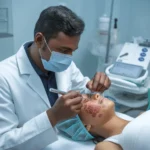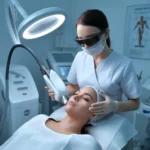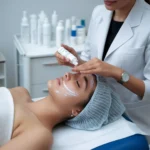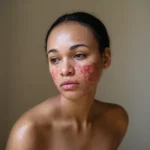How to Remove Pimples, Acne Scars, and Dark Spots from Your Face
- Home
- Acne Scars
- how to remove pimple marks
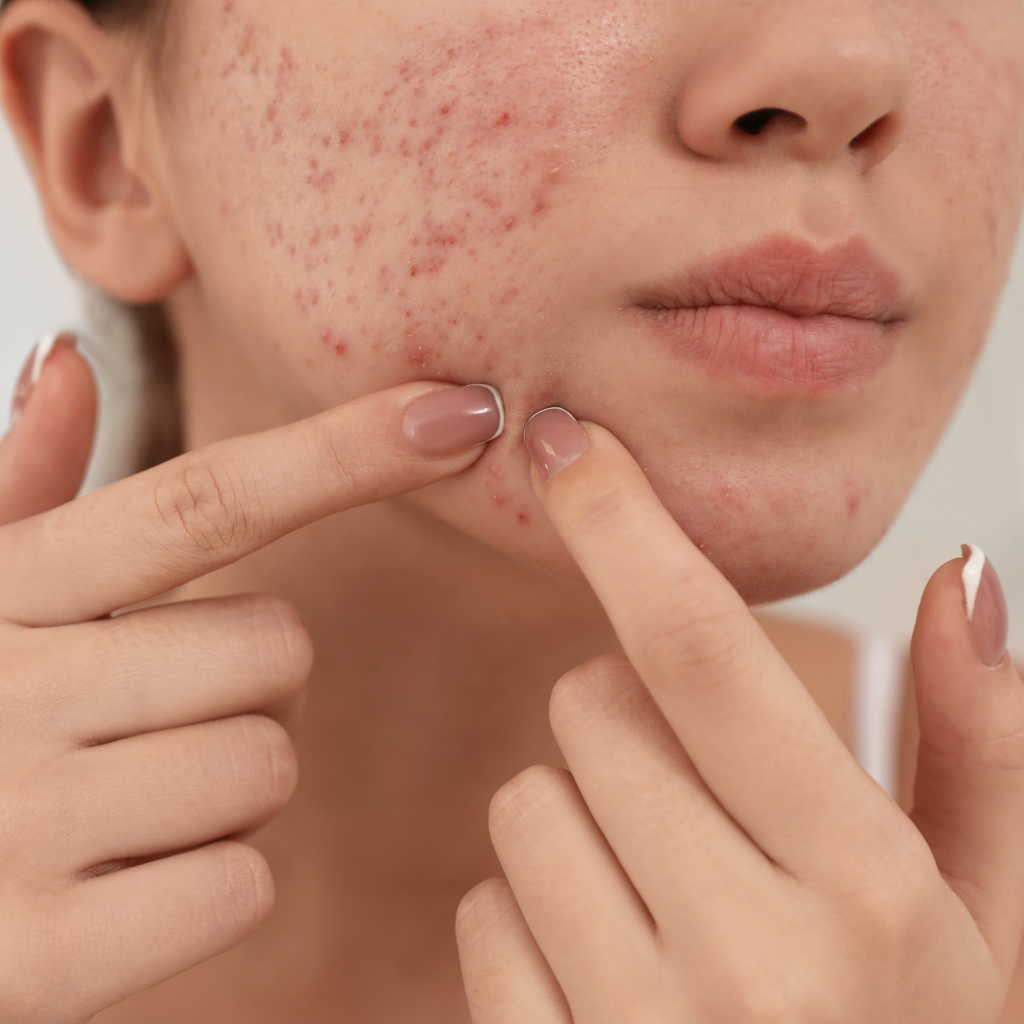
Incorporating treatments like salicylic acid, chemical peels, laser therapy, and mindful daily skin care routines are essential to eliminate pimples, acne scars, and dark spots. Regular application of natural remedies such as aloe vera and lemon juice can also promote healing and diminish pigmentation. For a more tailored approach and persistent issues, consulting a dermatologist is advisable. Continued attention to these strategies enhances skin clarity and health, offering more thorough solutions.
How to Treat and Remove Acne Scars Permanently?
Effective treatment of acne scars requires tailored approaches based on skin type and scar severity.
Salicylic acid is frequently utilized for its ability to penetrate pores and reduce inflammation, playing an essential role in minimizing the appearance of scars.
Additionally, techniques such as microdermabrasion and chemical peels offer viable options for resurfacing the skin and diminishing dark spots, particularly on darker skin tones.
How to Remove Pimple Marks on Darker Skin Tones
While treating pimple marks on darker skin tones requires a nuanced approach, specific evidence-based methods have shown effectiveness.
Darker skin tones are prone to post-inflammatory hyperpigmentation and may develop more frequent keloid scars or hypertrophic scars.
- Chemical Peels: Utilizing gentle acids can help lighten dark spots and reduce the appearance of scars.
- Topical Retinoids: These compounds accelerate cellular turnover, helping to fade dark spots and prevent the formation of new acne scars.
- Laser Therapy: Carefully administered laser treatments can target pigmented cells without damaging the surrounding tissue, making it a viable option for improving skin tone and minimizing scar visibility.
What Role Does Salicylic Acid Play in Acne Scar Removal
Salicylic acid plays a pivotal role in the management of acne scars by acting as a potent keratolytic agent. It facilitates the shedding of the outer layer of skin cells, thereby enhancing the skin’s surface renewal.
This property helps to unclog pores, reduce inflammation, and minimize the formation of acne breakouts, often precursors to acne scars. By promoting the removal of dead skin cells, salicylic acid prevents debris accumulation, which can exacerbate dark spots and scarring.
In addition, its ability to penetrate pores profoundly supports the healing process, gradually diminishing the appearance of acne scars. Regular use of salicylic acid can lead to clearer skin, significantly reducing the visibility of new and existing scars.
Can Microdermabrasion Help Get Rid of Deeper Scars
Can microdermabrasion effectively address deeper acne scars?
Microdermabrasion, a popular non-invasive procedure, primarily targets the superficial layers of the skin. While it can enhance skin texture and promote the formation of new skin cells, its efficacy in treating deeper scars is limited.
Here’s why:
- Superficial Reach: Microdermabrasion is designed to remove the top layer of the skin, which does not penetrate deep into the skin where more severe scars reside.
- Collagen Production: Although it boosts collagen production, the increase is typically insufficient to meaningfully repair deeper layers of the skin tissue involved in severe scarring.
- Scar Removal Treatments: For more profound scars, treatments that reach deeper into the skin, such as laser therapy or microneedling, might be more effective in promoting cell regeneration and scar reduction.
Benefits of Chemical Peels for Dark Spot Removal
Chemical peels effectively diminish dark spots and improve the overall appearance of acne scars by intensely exfoliating the skin.
Utilizing various acid solutions, a chemical peel targets the skin’s top layer, promoting removing damaged cells. This process not only helps to remove dark spots caused by sun exposure and hormonal changes but also aids in managing acne by clearing clogged pores.
The subsequent regeneration of skin tissue facilitates dark spot removal and can significantly lighten the skin, leading to a more even skin tone.
Furthermore, chemical peels reduce acne scars, enhancing skin texture and clarity.
When performed correctly, these treatments offer a potent means to rejuvenate the skin’s appearance thoroughly.
When should you consult a dermatologist for pimple scars?
Individuals experiencing persistent or severe acne scars, including those caused by postpartum acne, may benefit from consulting a dermatologist, who can offer advanced treatment options such as professional laser therapy.
A dermatologist utilizes focused light therapy during a laser treatment session to reduce scar tissue and promote skin regeneration.
This professional intervention can be particularly effective for deep or extensive scarring that does not respond to over-the-counter treatments.
What to Expect in a Professional Laser Treatment Session
Patients should consult a dermatologist to evaluate their suitability when considering professional laser treatment for pimple scars.
A typical laser treatment session designed to remove acne scars and treat acne involves several steps:
- Preparation: If necessary, the skin is cleansed, and a topical anesthetic is applied to minimize discomfort.
- Procedure: Laser beams are carefully directed at the scars or dark spots on the skin to reduce their appearance without harming surrounding tissue.
- Post-treatment care: Patients might experience mild redness or swelling, typically subsiding within a few hours to days.
This non-invasive method effectively treats acne marks, promoting collagen regeneration and smoother skin texture, significantly improving the skin’s overall appearance.
How Can a Dermatologist Assist in Treating Acne Marks
While professional laser treatments offer a promising solution for reducing the visibility of acne scars, dermatologists play a pivotal role in assessing and managing acne and its residual effects. Specializing in acne vulgaris, a dermatologist can provide tailored acne scar treatment plans that address various types of acne scars, such as atrophic acne scars, boxcars, icepicks, and rolling scars. Treatments for dark spots and severe scarring may include chemical peels, microneedling, and prescription topical treatments, each chosen based on the specific nature and severity of the scar tissue.
|
Type of Scar |
Recommended Treatment |
|
Atrophic Scars |
Dermal fillers, Laser therapy |
|
Boxcar Scars |
Chemical peels, Dermabrasion |
|
Icepick Scars |
TCA Cross, Punch excision |
|
Rolling Scars |
Subcision, Radiofrequency |
Consulting with a dermatologist guarantees a thorough approach to treating dark spots and promoting skin healing and rejuvenation.
How to Prevent Future Pimple Marks and Dark Spots?
To mitigate the risk of pimple marks and dark spots, consistent sun protection is essential, as UV exposure can intensify hyperpigmentation.
A tailored daily skincare regimen, vital for managing acne, especially on melanin-rich skin, should include non-comedogenic products to prevent clogged pores.
These preventive strategies are foundational in maintaining skin clarity and reducing the incidence of acne-induced discoloration.

Importance of Sun Protection in Preventing Dark Spots
Although often overlooked, sun protection is a critical component in the prevention of dark spots and future pimple marks.
Utilizing a broad-spectrum SPF can shield the skin from UV rays that exacerbate dark spots caused by pimples and prevent acne flare-ups triggered by sun exposure.
Here are key strategies:
- Broad Spectrum SPF: Essential for protecting against UVA and UVB rays, which can worsen dark skin patches and promote premature aging.
- Regular Reapplication: Guarantees continuous protection, especially after sweating or swimming, to effectively target dark spots.
- Complementary Treatments: Combine natural remedies and different treatments designed to remove dead skin and enhance the skin’s overall health.
These practices can significantly bolster the skin’s defense against forming dark spots and pimple marks.
Daily Skin Care Routine to Get Rid of Acne on Dark Skin
Establishing a daily skincare routine tailored for dark skin can be essential in both eliminating acne and preventing future pimple marks and dark spots.
Selecting a face wash that effectively removes impurities without stripping natural oils is vital for individuals prone to acne. Products containing benzoyl peroxide are recommended, as they target bacteria and help shed dead skin cells, reducing the likelihood of pore clogging.
Following cleansing, a moisturizer that hydrates and moisturizes the skin should be applied to maintain skin barrier function and prevent irritation.
Consistency in this routine not only aids in managing current acne but also minimizes the development of subsequent dark spots, promoting a more transparent, healthier complexion for acne patients.
What are the Best Home Remedies to Remove Pimple Marks?
Exploring effective home remedies for reducing pimple marks, research highlights several natural ingredients.
Aloe Vera is known for its healing properties and potential to fade scars, while lemon juice has been studied for its vitamin C content, which can help lighten hyperpigmentation.
Additionally, a mixture of honey and turmeric is documented for its anti-inflammatory and antibacterial benefits, potentially reducing scarring and promoting clear skin.
How Can Aloe Vera Help Reduce Pimple Marks
How does aloe vera contribute to the reduction of pimple marks?
Aloe vera, a widely recommended treatment in home remedies for skin care, helps heal the skin’s tissues affected by acne. Its application is associated with several beneficial properties:
- Anti-inflammatory properties: Aloe vera reduces inflammation and redness around pimple scars, helping the surrounding skin to heal quickly.
- Promotion of new skin cell growth: It stimulates the regeneration of skin cells, which aids in the fading of dark marks and scars at home.
- Moisturizing effect: Aloe vera prevents the excess development of scar tissue and helps eliminate dark spots effectively by keeping the skin hydrated.
These characteristics make aloe vera a valuable component against pimple marks.
Does Applying Lemon Juice Work for Dark Spots
While aloe vera is praised for its skin-healing properties, another common home remedy for treating dark spots is the application of lemon juice. Lemon juice contains vitamin C and citric acid, which are known to lighten dark spots and prevent acne scars on the skin’s surface. The high concentration of vitamin C, a powerful antioxidant, helps regenerate skin cells, while citric acid is a natural exfoliant, removing dead cells and promoting a healthier skin surface.
Ingredient | Property | Effect on Skin |
Lemon Juice | Vitamin C | Brightens dark spots |
Lemon Juice | Citric Acid | Exfoliates dead cells |
Skin’s Surface | Application | Reduces visibility of acne scars |
Evidence suggests that when used judiciously, lemon juice can diminish the appearance of dark spots and help rid acne scars.
Steps to Use Honey and Turmeric for Scar Treatment
Turning to nature’s apothecary, honey and turmeric are effective remedies for diminishing pimple marks. Both ingredients are esteemed for their anti-inflammatory and antibacterial properties, which are essential in scar treatment, particularly for acne scars, which are one of the most common skin concerns.
- Manuka Honey: Recognized for its higher therapeutic properties, it can reduce inflammation and promote healing of atrophic scars, which have unclear edges.
- Turmeric Contains curcumin, which is known to lighten hyperpigmentation and reduce dark spots.
- Application Method: Mix one teaspoon of Manuka honey with a quarter of turmeric powder. Apply to cleansed skin, leave for 20 minutes, then rinse with lukewarm water.
These natural options offer a gentle alternative to harsher over-the-counter products.

Remove Pimples Fast with Apple Cider Vinegar: Clear Skin at Home
After exploring the benefits of honey and turmeric for treating acne scars, another natural remedy that garners attention for its effectiveness is apple cider vinegar (ACV). Apple cider vinegar is promoted for its ability to balance the skin’s pH, which can prevent bacteria growth and clog pores on the surface of your skin. When applied correctly, it can penetrate the acne pore without causing further irritation, helping to remove pimples quickly and reducing the appearance of acne scars and dark spots.
Property | Effectiveness | Application Method |
pH balance | High | Diluted topical |
Antibacterial | Moderate to high | Direct dab |
Exfoliation | Moderate | Diluted wash |
Scar reduction | Moderate | Regular application |
What Creams and Products Are Effective for Dark Spot Removal?
In the context of dark spot removal, retinoids are frequently utilized due to their ability to accelerate cellular turnover, thereby fading hyperpigmentation effectively.
Conversely, Vitamin C serums are pivotal in inhibiting melanin production, critical in lightening dark spots and enhancing skin radiance.
Both ingredients are backed by substantial dermatological research, highlighting their efficacy in treating post-acne discoloration.
Understanding the Role of Retinoids in Spot Removal
Retinoids play an essential role in the treatment of hyperpigmentation and acne scars, leveraging their ability to accelerate cellular turnover and diminish dark spots.
These vitamin A derivatives penetrate deeper into the skin, facilitating the removal of damaged cells and promoting a healthier skin surface.
- Enhanced Cellular Renewal: Retinoids increase the rate at which skin cells are renewed, helping to fade pimple marks and lessening the visibility of acne scars.
- Prevention of New Acne: By keeping pores clear, retinoids prevent the formation of new acne, reducing future damage to your skin.
- Collagen Production: They stimulate collagen production, which is essential for repairing the skin’s structure and alleviating the type of scar that can develop from severe acne.
This multifaceted approach makes retinoids a cornerstone in eliminating acne and its residual scarring.
How Do Vitamin C Serums Help Lighten Dark Spots
While retinoids effectively address the renewal of skin cells and prevent new acne, Vitamin C serums offer a complementary approach to skin rejuvenation, particularly in lightening dark spots.
Vitamin C, as an antioxidant, mitigates the impact of oxidative stress in skin cells caused by environmental aggressors and ultraviolet exposure. This reduction in oxidative stress helps to prevent the overproduction of melanin, which is often responsible for hyperpigmentation and dark spots resulting from acne lesions.
Additionally, Vitamin C stimulates collagen production, addressing scars that are usually elevated due to too much collagen during the healing process.
For deeper pigmentation issues, combining Vitamin C with exfoliating agents like glycolic acid or lactic acid can enhance the fading of dark spots, offering practical ways to remove pimple marks.
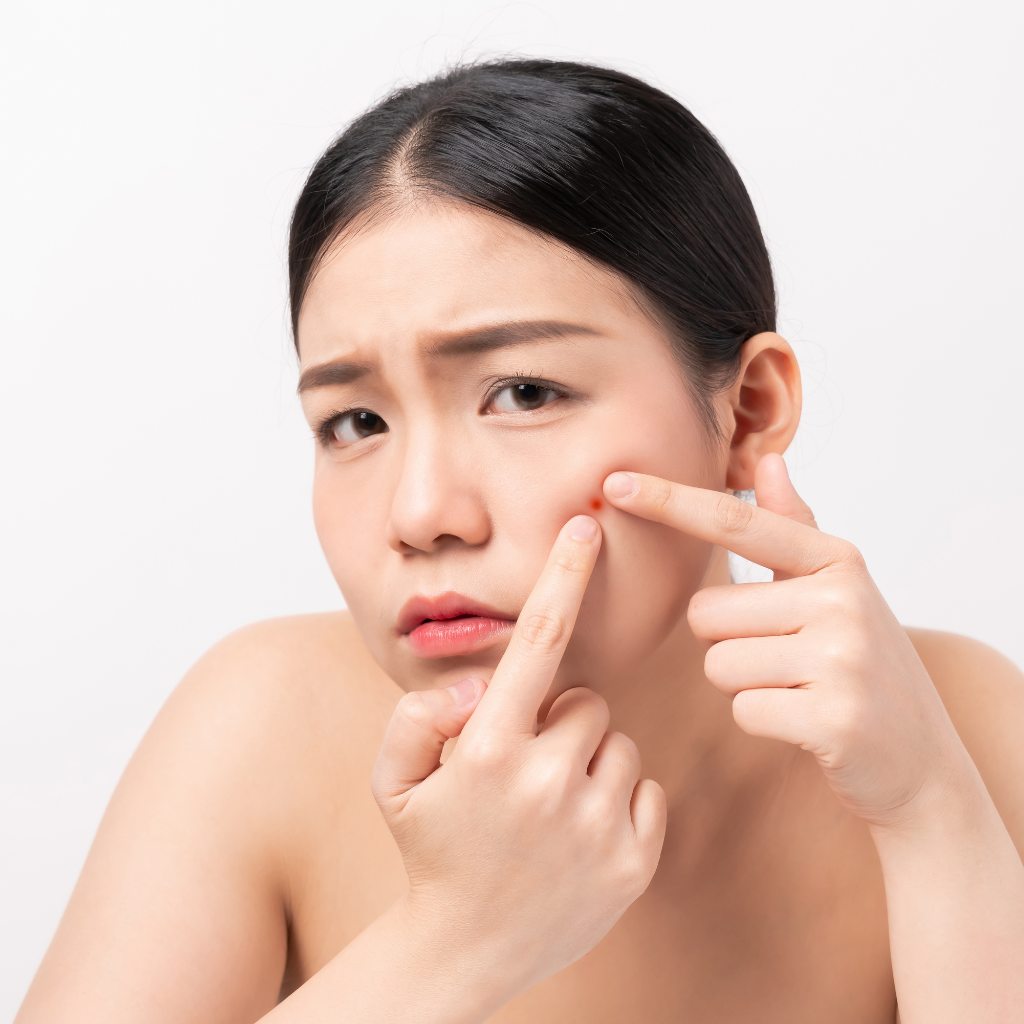
How Do Vitamin C Serums Help Lighten Dark Spots
While retinoids effectively address the renewal of skin cells and prevent new acne, Vitamin C serums offer a complementary approach to skin rejuvenation, particularly in lightening dark spots.
Vitamin C, as an antioxidant, mitigates the impact of oxidative stress in skin cells caused by environmental aggressors and ultraviolet exposure. This reduction in oxidative stress helps to prevent the overproduction of melanin, which is often responsible for hyperpigmentation and dark spots resulting from acne lesions.
Additionally, Vitamin C stimulates collagen production, addressing scars that are usually elevated due to too much collagen during the healing process.
For deeper pigmentation issues, combining Vitamin C with exfoliating agents like glycolic acid or lactic acid can enhance the fading of dark spots, offering practical ways to remove pimple marks.
Conclusion
Treating acne scars, pimple marks, and dark spots requires a multifaceted approach. Consulting a dermatologist is vital for persistent or severe cases. Preventative measures, like proper skincare routines, are essential to mitigate future issues. Home remedies can offer gentle alternatives, while targeted creams and products, supported by clinical evidence, provide potent treatment options. Ultimately, combining professional advice, preventative care, and scientifically backed products yields the best skin health and appearance results.

Dr. Sheena Majella is a certified dermatologist and the leading skin specialist at Tune Aesthetics. With a deep passion for skin health and beauty, she combines medical expertise with advanced aesthetic treatments to help clients look and feel their best.

